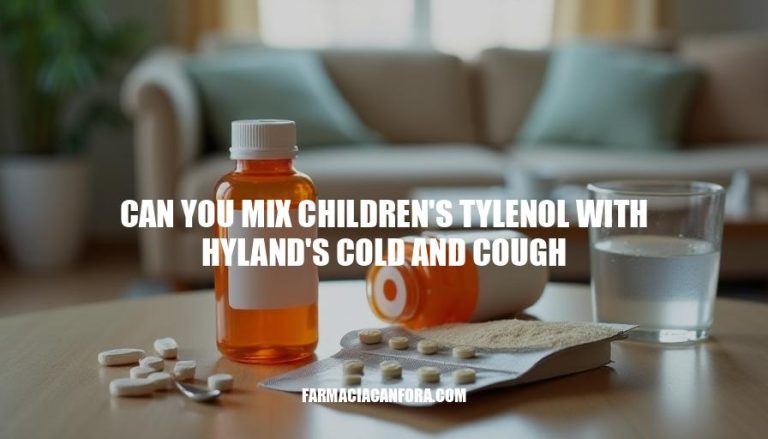


You can safely give your child Tylenol (acetaminophen) and Hyland’s Cold and Cough together. This is because Hyland’s doesn’t contain ingredients that interact with acetaminophen. But it’s still important to be aware of potential interactions, especially when treating kids.
Some cold medicines can have acetaminophen in them, which increases the risk of an accidental overdose.
To be safe, always talk to a pediatrician or healthcare provider before giving your child any medications together. They’ll help you figure out the right doses and make sure it’s okay for their specific health needs.
When deciding whether to mix children’s Tylenol with Hyland’s Cold and Cough, several factors must be carefully considered:
Active Ingredients: Children’s Tylenol contains acetaminophen, which is used to reduce fever and relieve pain. Hyland’s Cold and Cough is a homeopathic remedy with highly diluted ingredients like Allium Cepa and Hydrastis, aimed at alleviating cold symptoms. While Hyland’s products generally do not contain acetaminophen, it is crucial to confirm this by reading the label to avoid accidental duplication of active ingredients.
Potential Overlapping Effects: Acetaminophen is a potent medication, and its effects should not overlap with other drugs that may contain similar fever-reducing or pain-relieving components.
Hyland’s Cold and Cough does not typically interact with acetaminophen due to its homeopathic nature. However, some cold medications may contain pseudoephedrine or other ingredients that could increase heart rate or cause other side effects.
Risks of Overdose: Overdosing on acetaminophen can lead to severe liver damage, especially in children. It is essential to ensure that no other medications being administered contain acetaminophen or similar compounds.
Additionally, incorrect dosing of any medication can result in toxicity or adverse effects.
Importance of Reading Labels: Medication labels provide critical information about active ingredients, dosage instructions, and warnings. Parents and caregivers must thoroughly review these labels to ensure safe administration and avoid harmful interactions.
General Guidelines from Health Professionals: Health professionals recommend consulting a pediatrician before combining medications, especially for children. They emphasize the importance of adhering to age-appropriate dosages and monitoring for any adverse reactions.
Careful consideration of these factors and consultation with a healthcare provider can help ensure the safe use of medications for children.
1hellopharmacist.com2hylands.com3www.healthtap.com4www.aafp.org5www.pedistat.com
When considering whether to mix children’s Tylenol with Hyland’s Cold and Cough, several factors must be carefully evaluated. Children’s Tylenol contains acetaminophen, which is used to reduce fever and relieve pain, while Hyland’s Cold and Cough is a homeopathic remedy aimed at alleviating cold symptoms.
To ensure safe administration, it’s crucial to confirm that Hyland’s product does not contain acetaminophen by reading the label. Additionally, potential overlapping effects of acetaminophen with other medications should be considered, as well as the risks of overdose and incorrect dosing.
Health professionals recommend consulting a pediatrician before combining medications, especially for children, to ensure adherence to age-appropriate dosages and monitoring for any adverse reactions. Parents and caregivers must thoroughly review medication labels to avoid harmful interactions.
In summary, it’s essential to consult a healthcare professional before giving your child both Tylenol and Hyland’s Cold and Cough to ensure their safety and well-being. They will help determine the right doses and make sure it’s okay for their specific health needs.